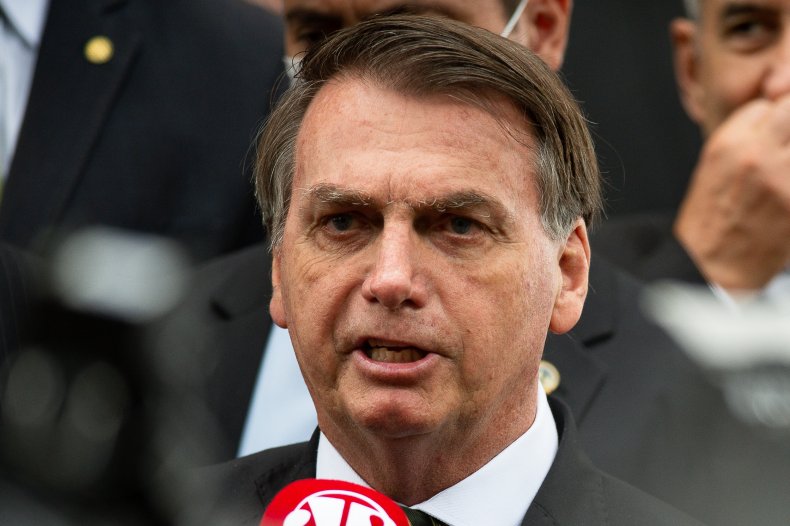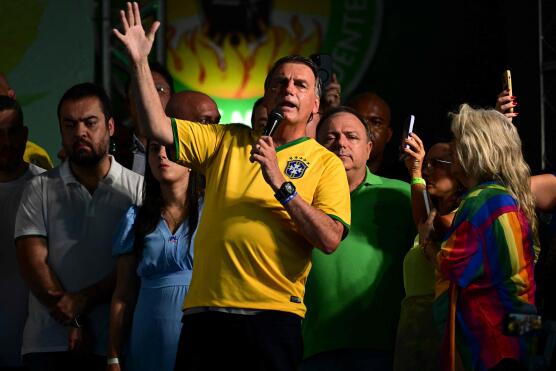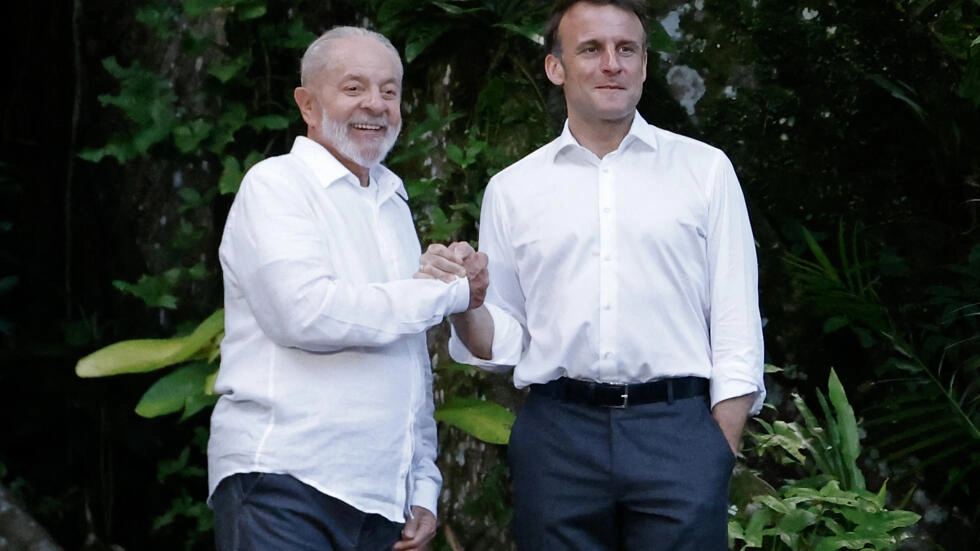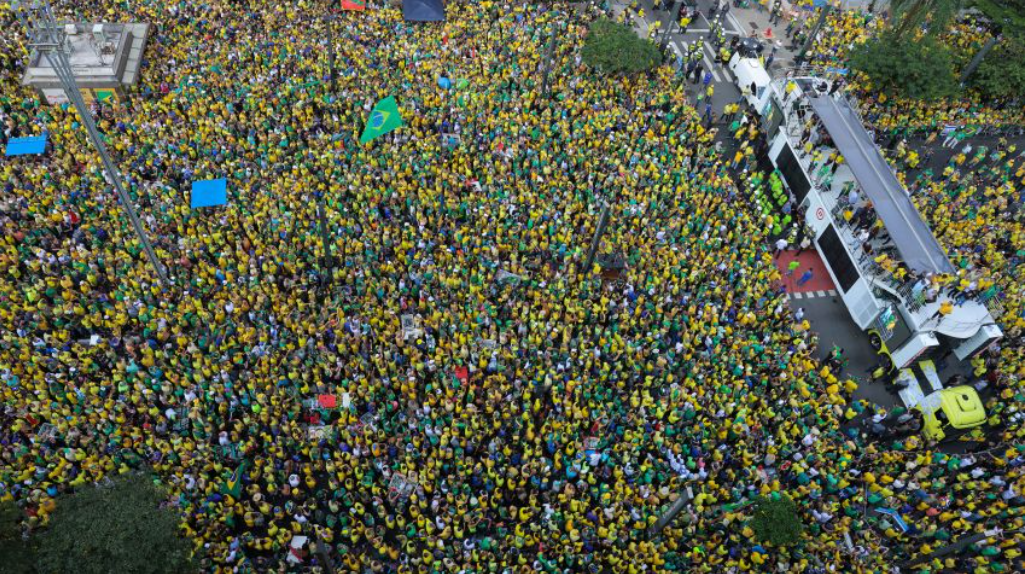This article is more than
4 year oldAs Brazil's Bolsonaro Enjoys BBQ Despite COVID-19, the Poor Face Starvation
Few world leaders have been as exposed by the coronavirus pandemic as Brazilian President Jair Bolsonaro. The far-right leader has consistently rejected any suggestion that the virus—which has killed some 12,400 Brazilians—poses a threat to his citizens, and repeatedly attacked any lawmakers, media figures or even his own ministers that disagree.
Bolsonaro was swept to power in a wave of anti-establishment sentiment in the 2018 presidential election. The 65-year-old was already one of the most divisive world leaders before the pandemic, but its arrival in Brazil has highlighted the shortcomings of the populist who has shown little regard for science or public health.
Bolsonaro's ambivalence has done nothing to stop the virus's spread. There have now been more than 178,000 confirmed cases in the country—the eighth-most in the world—and the daily increase in the total is still accelerating.
Last weekend, videos emfserged of Bolsonaro enjoying a floating BBQ, jet-skiing out to meet others on a boat and flouting social distancing guidance. The president has also repeatedly mocked lawmakers who have introduced tighter restrictions on public freedoms and economic activity, and when asked about the Brazilian death toll reaching 5,000 last month simply replied: "So what?"
Coronavirus is a perfect storm for Brazil—one of the most unequal countries in the world. The country's poorest live in densely-populated and poorly serviced favelas—shantytowns on the outskirts of Brazil's major cities. Some 12 million people live in the favelas, where the state's authority can be weak and where the police and military periodically demonstrate their power through deadly raids against powerful criminal gangs.
Favelas have generally been a low priority for the federal government. Successive administrations have preferred to hide the areas away from the world, building walls to block them from the view of visitors and keeping them off tourist maps.
Now coronavirus is spreading through such communities, overwhelming scant medical services and threatening destitution for many. Meanwhile, Bolsonaro's dismissal of the crisis is making it difficult for community activists to keep their communities focused.
Eliana Sousa Silva is the director of the Redes da Maré organization in the Maré favela of Rio de Janeiro, close to the city's international airport and home to around 140,000 people.
Silva told Newsweek that all of Redes da Maré's projects have been undermined by the pandemic, with widespread hunger a fresh challenge for activists. One of the group's first priorities was to secure enough food to support 6,000 of the favela's most vulnerable families to ensure they would not starve.
Redes da Maré is also providing more than 300 meals each day for the favela's homeless residents, Silva said, plus more for those who are sick and quarantining. As a side benefit, the program also provides jobs for unemployed people struggling to make ends meet.
Unemployment is on the rise nationwide, and last month the privatization secretary, Salim Mattar, warned the number—currently just over 12 percent—could soon double. The federal government has passed a bill providing a 600 reais (around $103) monthly payment for informal workers and small business people who have lost their income, but the plan's rollout has been beset by delays and confusion.
Silva said few in Maré had been able to access the payments, and even for those who have it is a "very little amount of money." Newsweek has contacted Bolsonaro's office to request comment on his government's response to the coronavirus pandemic and support for at-risk communities around the country.
Meanwhile, the favela's health system is collapsing. Maré has seven family health centers and one medium-sized hospital, Silva said, which were already stretched to breaking point before the pandemic arrived. Now, the system is in "complete chaos," she warned, with treatment for all other illnesses stopped.
Homeless residents and those with drug problems are especially at risk. Maria Angélica Comis is the director of É de Lei in São Paulo, an organization that works to support such groups. She told Newsweek that É de Lei has pivoted to a more active health provision role since the pandemic began, distributing health guidance, medical supplies and water.
But they are fighting a losing battle. "The situation got worse very quickly," Comis explained. The organization relies on food donations to feed those they support, but when businesses and offices started to close these donations dried up.
The federal government, meanwhile, "are making everything difficult," Comis added. "They are systematically denying the COVID problem and the COVID crisis in Brazil," she explained. The São Paulo city government is trying to retain some services and provide some food for the homeless, but Comis noted it is not enough.
"Police violence is also very present," Comis said. Harassment, pat-downs, and even rubber bullets and tear gas still face those with nowhere to go.
Limited coronavirus testing and health care access mean people are dying in the streets, Comis explained. Though in theory homeless people have access to medical care, "in practice what happens is that they face a lot of stigma and prejudice from healthcare professionals, so they often choose not to look for these services."
Comis said her group had recorded at least 20 homeless deaths across the 10 days before she spoke with Newsweek. But Comis' group only works with a small number of the city's homeless people and many other deaths are not even being recorded. It is hard to gauge the true scale of the disaster.
Back in Rio's hillside favelas known as Complexo do Alemão, Raull Santiago—the vice president of Coletivo Papo Reto—said the coronavirus crisis has "increased our existing inequalities" and presented a new "huge problem."
Facing it is not easy when the president is pretending that nothing is wrong. "Having a president such as Bolsonaro say things publicly that go expressly against the World Health Organization's guidance is the biggest problem we face," Santiago told Newsweek. "It incentivizes people to not follow social isolation and to keep leading their lives normally as if nothing has happened."
As elsewhere, organizers in Complexo do Alemão are struggling to protect residents who do not have good access to clean water and are unable to socially distance. But hunger has become "more of a problem than ever," Santiago said, and the biggest one they face. Coletivo Papo Reto—which is reliant on donations—is "being overwhelmed" by the amount of work and struggling "with no political participation from any level," Santiago added.
In some favelas, there have been reports of criminal gangs doing what the federal government has not—handing out medical supplies, drinking water and enforcing curfews to try and slow the spread of the virus. "The government doesn't want to do anything to help the favelas," Santiago said, but they are also failing to give any useful information or even convince people there is a problem.
Last week, Bolsonaro claimed that the "worst is over" for the coronavirus pandemic in Brazil, even as the daily death toll and infection rates rose. But as the country moves into winter and its annual flu season, the activists who spoke to Newsweek did not share their president's optimism. Asked if he agreed with Bolsonaro, Santiago replied: "On the contrary."

on May 07, 2020 in Brasilia, Brazil.ANDRESSA ANHOLETE/GETTY IMAGES/GETTY |

Newer articles
<p>Chinese officials say they "firmly oppose" the platform being divested.</p>
TikTok ban now ‘inevitable’
Ukraine ‘will have a chance at victory’ with new US aid, Zelenskyy says
Israel Iran attack: Damage seen at air base in Isfahan
Who will be Trump’s VP? A shortlist
‘URANIUM’: Terrifying detail about Israel’s strike on Iran emerges
Ukraine war: Kyiv uses longer-range US missiles for first time
House passes potential TikTok ban that could speed through Senate
Caught between Israel and Iran, Jordan clings desperately to stability
Taylor Swift broke Spotify record with new album



